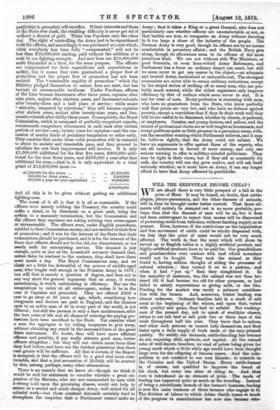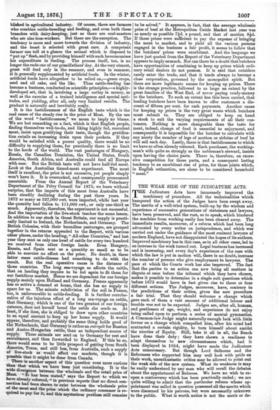WILL THE BEEFSTEAK BECOME CHEAP?
are afraid there is very little prospect of a fall in the price of Meat. It may be hoped, no doubt, that cattle- plague, pleuro-pneumonia, and the other diseases of animals, will in time be brought under better control. That these ail- ments will entirely be stamped out is no more probable, per- haps, than that the diseases of men will be so, but it does not seem extravagant to expect that means will be discovered of protecting cattle from infection, without limiting supply, as at present. Even, however, if the restrictions on the importation and free movement of cattle could be wholly dispensed with, we fear that the price of meat would not be very much affected. The truth is, that the meat which will alone be served up at English tables is a highly artificial product, and highly-artificial products have to be paid for. Our grandfathers and grandmothers were content with beef which nowadays would not be bought. They took the animal as they found it, having seldom thought of aiding the processes of natural selection ; they turned it on to a pasture, and when it had "put up" flesh they slaughtered it. In the majority of instances, too, the animal was not thus fat- tened till it had become too old for other purposes, or had failed to satisfy expectations in giving milk, or the like. Feeding for the market was rarely a primary considera- tion with the farmer. And, moreover, winter feeding was almost unknown. Ordinary families laid in a stock of salt meat at the beginning of the winter, and upon that, varied with poultry and game, they had to subsist. But working- men of the present day, not to speak of wealthier classes, refuse to eat salt beef or salt pork two or three days of the week throughout half the year. They leave that to sailors, and other such persons as cannot help themselves, and they insist upon a daily supply of fresh meat of the very primest quality. To satisfy our demands, cattle-breeding has become an art, requiring skill, aptitude, and capital. At the annual sales of well-known breeders, we read of prices being given for young stock which a little while ago would have been thought large even for the offspring of famous racers. And the com- petition is not confined to our own Islands ; it extends to the Colonies and the United States. Every cattle-farmer is, of course, not qualified to improve the breed of his stock, but every one aims at doing so. And thus race is introduced as an element of price. The mode of feeding has improved quite as much as the breeding. Instead of being a subordinate branch of the farmer's business, feeding is now the main business of those farmers who engage in it. The division of labour to which Adam Smith traces so much of the progress in manufactures has now also become esta- Wished in agricultural industry. Of course, there are farmers who combine cattle-breeding and feeding, and even both these branches with dairy-keeping, just as there are coal-masters who are also iron-workers. But these are the exception. The tendency is more and more towards the division of industry, and the beast is selected with great care. A competent farmer can tell at a glance the animal which is disposed to "put up" flesh, and by providing himself with such he economises his expenditure in feeding. The process itself, too, is no longer the rude one of our grandfathers' day. At the very utmost, grass will feed only in the summer, and even in summer, it is generally supplemented by artificial foods. In the winter, artificial foods have altogether to be relied on,—green crops, seed and oil cake, and the like. Thus cattle-feeding has become a business, conducted on scientific principles,—a highly- developed art, that is, involving a large outlay in money, as well as the exercise of a trained intelligence and special apti- tudes, and yielding, after all, only very limited results. The product is naturally and inevitably costly. It is the fastidiousness of the English taste which is the real cause of the steady rise in the price of Meat. By the use of the word "fastidiousness," we mean to imply no blame. We are but remarking on a fact, which is that English people, finding themselves well-to-do, and liking highly fed, succulent meat, insist upon gratifying their taste, though the gratifica- tion entails an increasing drain upon their pockets. If they would be satisfied with a poorer quality, there would be no difficulty in supplying them, for practically there is no limit to the herds of the world. The vast pasturages of Hungary, Russia, the Canadian Dominion, the United States, South America, South Africa, and Australia could feed all Europe with ease. But the British taste will not have half-fed meat. Look at the Australian tinned-meat experiment. The meat itself is excellent, the price is not excessive, yet people simply won't have it. It is overcooked, and consequently pronounced uneatable. From the Annual Report of the Veterinary Department of the Privy Council for 1875, we learn without surprise, that the imports of this meat from Australia have been steadily declining during the past three years. In 1872 as many as 327,000 cwt. were imported, while last year the quantity had fallen to 111,000 cwt., or only one-third as much. Apparently, therefore, the experiment is not successful. And the importation of the live-stock teaches the same lesson. In addition to our stock in Great Britain, our supply is practi- cally limited to Ireland, the Netherlands, and Germany. The British Colonies, with their boundless pasturages, are grouped together in the returns appended to the Report, with various other places, under the heading, " All other Countries," and last year they sent us only one head of cattle for every two hundred we received from other foreign lands. Even Hungary, Russia, and Spain sent us a quantity so small as to be able to exercise no effect on the price. No doubt, in these latter cases cattle-disease had something to do with the result. But the real operative cause is the distance of those countries. The long sea-voyage so affects the cattle, that on landing they require to be fed again to fit them for our fastidious market. Hence we are dependent for our foreign supply mainly upon Holland and Germany. France apparently has so active a demand at home, that she has no supply to spare for us. The minute subdivision of the soil in France, too, is unfavourable to cattle-feeding. It is further corrobo- rative of the injurious effect of a long sea-voyage on cattle, that Germany, which is one of the two greatest of our foreign caterers, does not herself breed the cattle she sends us. At least, if she does, she is obliged to draw upon other countries to an equal amount to keep up her home supply. It would appear, therefore, and probably the same thing holds good of the Netherlands, that Germany is rather an eat repot for Russian and Austro-Hungarian cattle, than an independent source of supply. These animals are sent on to Germany for rest and recruitment, and then forwarded to England. If this be so, there would seem to be little prospect of getting from South America, Texas, and still less, from Australia, such a supply of live-stock as would affect our markets, though it is possible that it might be done from Canada. There is another aspect of this question even more curious than that which we have been just considering. It is the wide divergence between the wholesale and the retail price of Meat. "It has been stated," says the Report to which we have already referred, "in previous reports that no direct con- nection had been shown to exist between the whole I SS e price of the meat and the price which the ordinary consumer is re- quired to pay for it, and this mysterious problem still remains to be solved." It appears, in fact, that the average wholesale price of beef at the Metropolitan Cattle Market last year was as nearly as possible 7id. a pound, and that of mutton 8id. If those prices were sufficient to pay the expense of bringing the meat to market, and to yield all the various persons engaged in the business a fair profit, it seems to follow that the butchers' prices were exorbitant. And the language we have just quoted from the Report of the Veterinary Department appears to imply as much. Nor can there be a doubt that butchers have opportunities of combining to keep up prices which ordi- nary retail dealers do not possess. It is said that outsiders rarely enter the trade, and that it tends always to become a close corporation, governed by the monopolist spirit. But there are more legitimate causes for keeping up prices. There is the strange practice, followed to so large an extent by the great families of the West End, of never paying ready-money to the butchers. To such an extent has this.been carried, that leading butchers have been known to offer customers a dis- count of fifteen per cent. for cash payments. Another cause for keeping up prices is the very great waste which butchers must submit to. They are obliged to keep on hand a stock to suit the varying requirements of all their cus- tomers. Nothing is more changeable than the taste for meat, indeed, change of food is essential to enjoyment., and consequently it is impossible for the butcher to calculate with any nicety the number of legs of mutton or sirloins of beef he will sell each day. Lastly, there is that fastidiousness to which we have so often already referred. Each purchaser, the working- man's wife quite as strongly as the nobleman's steward, insists upon having the choice parts. There is, therefore, an exces- sive competition for these parts, and a consequent lasting tendency to an exorbitant rise of price, for those joints which, in English estimation, are alone to be considered household " meat."































 Previous page
Previous page